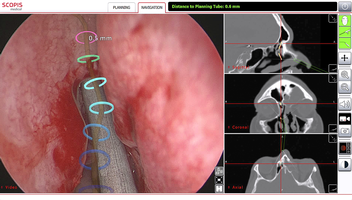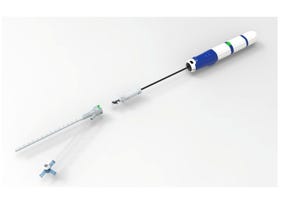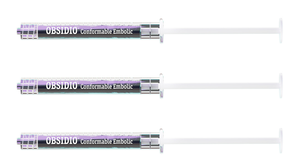February 15, 2017
Scopis recently opened an office in Cambridge and is cultivating investors in the U.S.
Nancy Crotti

Scopis offers target-guided surgery via augmented reality.
A German company that sells augmented reality products for minimally invasive surgery has landed in the United States.
Founded in 2010, Scopis GmbH offers augmented reality software to help surgeons plan ENT, craniomaxillofacial, neurological, spinal, and bronchoscopic procedures. The company's endoscopic hardware and software also enable surgeons to view a patient's anatomy during surgery with overlays of the patient's CT scans for guidance. Its goal is to develop navigation and measurement systems that can guide and document minimally invasive surgery, shorten procedure time, reduce complications, and improve outcomes.
Scopis products are sold in 50 countries worldwide and can be used with any OR system, according to CEO and founder Bartosz Kosmecki. He is in Boston this week to network with potential business partners and investors.
The idea for Scopis came to Kosmecki while working on his doctoral thesis in augmented reality for endoscopes� in Berlin in 2005.
"I recognized that there is a high demand for this technology in ENT surgery and also in neurosurgery, and I applied for a research grant that allowed me to transfer the technology into the company," he told Qmed.
Scopis has 40 German-based employees. The company has hired a North American vice president of sales, and is working on FDA approval of its products. The startup has had two successful rounds of fundraising within Germany. It is also getting an assist from the German Accelerator Life Sciences program, which opened an office in Cambridge last year to help German healthcare startups establish a U.S. presence.
Scopis is entering an increasingly crowded field. Surgeons were among the most enthusiastic users of the short-lived Google Glass technology. More recently, Royal Philips revealed it is working on an augmented-reality surgical navigation technology designed to help surgeons perform image-guided open and minimally invasive spine surgery.
Although much of the focus on the virtual and augmented reality industry centers on the gaming world, Goldman Sachs recently predicted that VR/AR software will generate more than $5 billion in healthcare sales by 2025.
Kosmecki said he believes Scopis has an edge over other AR-guided-surgery companies.
"The surgeon is guided on his predefined path to the target," by Scopis technology, he said. "The systems from competitors are displaying the position of the instrument itself so the surgeon knows where he actually is, but the current systems are not showing him how to get on a way to reach the target."
Nancy Crotti is a freelance contributor to Qmed.
[Image credit: Scopis GmbH]
About the Author(s)
You May Also Like


